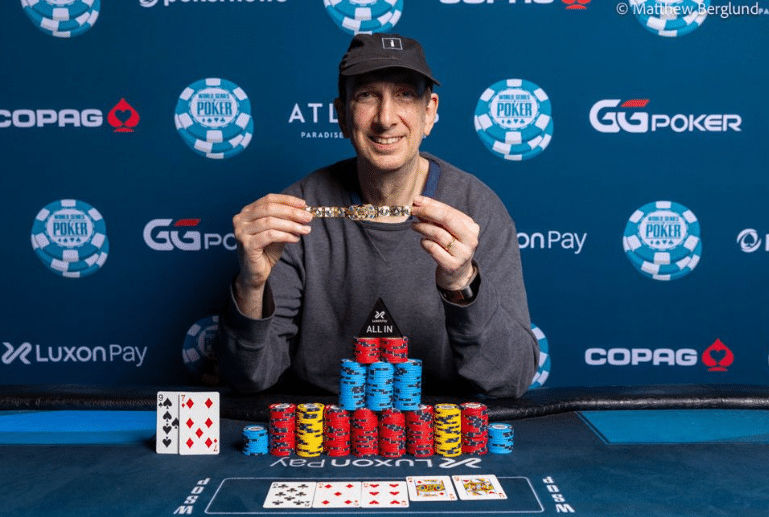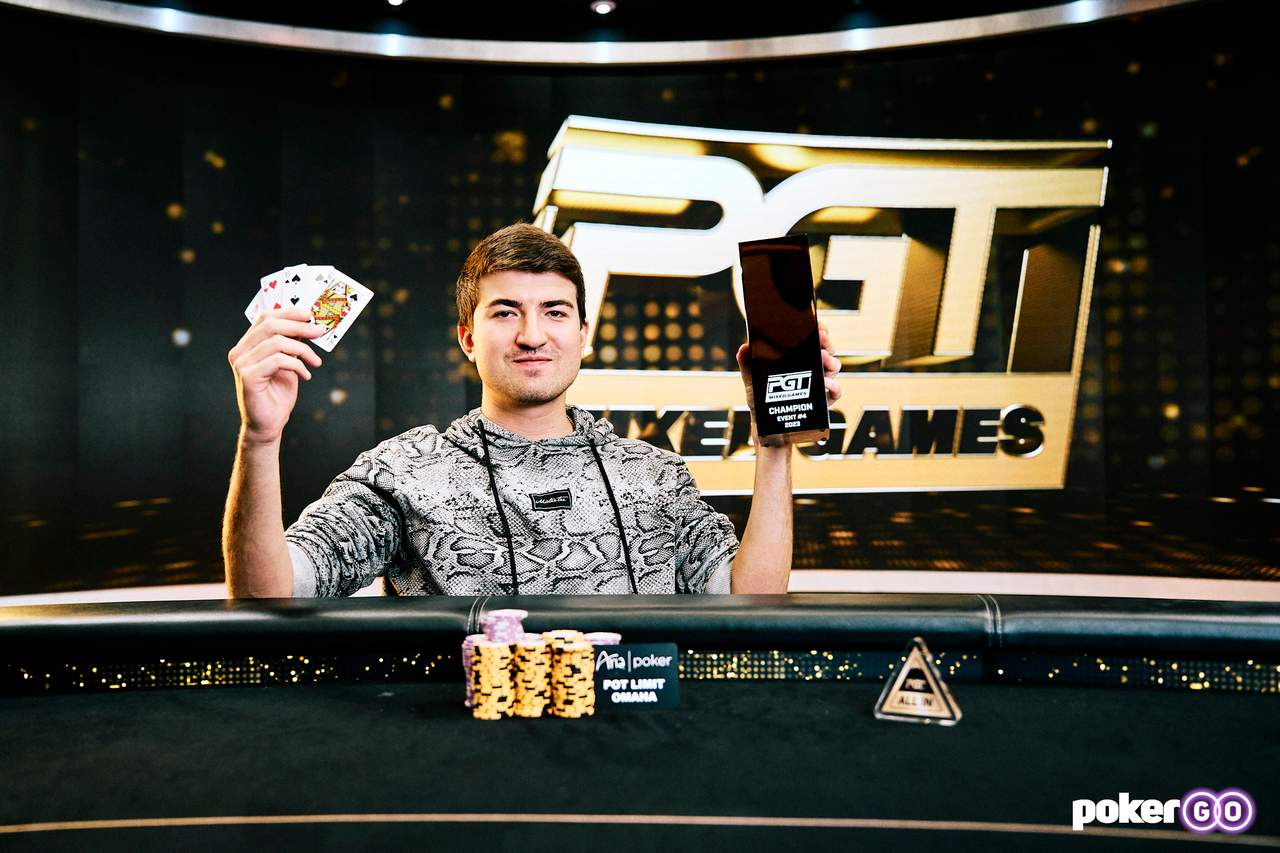Steven Chidwick Deals Devastation With Flopped Quads — And Still Manages to Get Paid
The Flop: “Oh My Goodness” Doesn’t Even Begin to Cover It
The board came out and instantly stopped the commentary booth:
Just quads for Steven Chidwick. Why not?
With stone-cold quads on the flop, Chidwick did what pros do best —
he disguised the strength and simply bet.
But then magic happened.
His opponent, Kathy Laney, raised.
A raise into quads.
The kind of moment that makes every elite player’s pulse slow down… and their chip stack speed up.
Chidwick didn’t react.
Didn’t blink.
Just called — letting the trap stay wide open.
The Turn: Chidwick Applies Maximum Patience
The turn brought the 9♥, changing nothing for Chidwick’s ironclad hand.
He checked — an absolutely perfect move — hoping to draw a river bet from Laney.
He gave her all the room she needed to hang herself.
This is where good players seize pots…
and great players extract everything.
The River: The Final Card… and the All-In
The river rolled off a 6, and the stage was set.
Laney reached for chips.
All signs pointed to strength — commentators speculated she held pocket eights, a hand strong enough to believe it was good on many boards.
Then she shoved.
Effective all-in.
A dream scenario for Chidwick.
But instead of slamming chips in gleefully, he calmly made the call — a man who knew he’d set the trap hours ago.
And then came the moment no one wanted:
Laney folded.
She found the discipline.
The pain.
The good fold against one of the toughest players alive.
Chidwick dragged the pot — big, clean, effortless — another chapter in his legacy of unrelenting precision.
A Hand That Defines Elite Poker
This wasn’t luck.
This wasn’t coincidence.
It was Steven Chidwick at his absolute best:
-
Flopped quads
-
Extracted maximum value
-
Controlled pot size perfectly
-
Induced a raise
-
Induced a shove
-
Won the hand without ever revealing a hint of celebration
Textbook.
Clinical.
Crushing.
Poker fans will replay this one again and again.
The Call Nobody Dared to Make – Until Erik Seidel Did


A Legend at the Table
There are moments in poker that feel less like a card game and more like a brushstroke on the canvas of history. For Erik Seidel, one of the most respected figures in the game, those moments arrive with a kind of quiet inevitability. His reputation has never been built on fireworks or theatrics. Instead, it rests on patience, wisdom, and an uncanny ability to see through the noise of the table.
And yet, in one of the most high-stakes environments imaginable—a Super High Roller final table—Seidel once again reminded the poker world why his name is spoken with reverence. He made a decision that would leave fans stunned, commentators speechless, and opponents shaking their heads in disbelief.
The Setup: A Battle of Wills
By the time this hand unfolded, the table dynamics were tight, the blinds were punishing, and the chips were moving fast. This was no leisurely affair—it was survival, skill, and nerve compressed into each hand. Across the table sat a formidable opponent, Demitri Urbanovich, a player with a reputation for fearlessness and creativity.
The action began innocuously enough. Urbanovich applied pressure, the kind of bet designed not only to win chips but to test the limits of an opponent’s resolve. It was the sort of move that forces most players into retreat.
But Erik Seidel is not “most players.”

The Tension Builds
From the start, Seidel appeared unfazed. His manner was calm, his eyes steady, as though he were listening to a story only he could hear. To the casual observer, this looked like a simple spot to fold. The board, the action, the betting patterns—all of it seemed to spell out trouble.
The commentators voiced what many watching at home were thinking: “This is an easy fold. Nobody makes this call.”
Yet Seidel didn’t release his cards. He leaned back, processing every detail—his opponent’s timing, the bet size, the texture of the moment. For those who have followed his career, this was classic Seidel: deliberate, patient, seeing beyond the obvious.
The Moment of Truth
As the final bet slid across the felt, the tension became unbearable. The room seemed to hold its breath. Seidel had nothing but instinct and decades of experience to guide him. On paper, folding looked rational. But poker is not played on paper—it is played in the trenches of psychology, intuition, and courage.
Then, in a decision that defied logic and expectation, Erik Seidel pushed forward the chips. He called.
Silence, then eruption. Against all odds, against every prediction, he was right. His opponent’s story had holes, and Seidel had read them perfectly. The pot slid his way, and the table tilted in his favor.

Dzmitry Urbanovich
Why It Matters
To some, this was just another hand. But to those who understand the game, it was a masterclass. Hero calls—the act of calling a large bet with a marginal holding—are rare. They demand not just courage, but clarity: the ability to dissect an opponent’s range, to weigh every factor, and to trust your read against the relentless fear of being wrong.
For most players, the risk of humiliation is too great. To make a hero call and lose is to invite disaster. But Seidel’s genius lies in knowing when the moment is real, when the story his opponent tells simply doesn’t add up.
That night, he trusted his instincts, and they carried him to glory.
Seidel the Eternal Outsider
It is easy to forget how long Erik Seidel has been at this game. From his early days battling titans in smoky rooms to becoming a fixture in modern high roller events, he has never relied on flash. While younger players chase headlines with wild bluffs and table talk, Seidel sits back, letting the game come to him.
His quiet presence belies the razor-sharp mind at work. He is, in many ways, the antithesis of the modern poker celebrity—no brash tweets, no wild outbursts, no desperate need for the spotlight. And yet, when he makes a move like this, the entire poker world takes notice.

Another game in Heads Up
The Psychology of Fearlessness
What makes a hero call so captivating is not the chips won, but the human element behind it. Every instinct screams “fold.” The brain tells you the math doesn’t add up. The audience expects you to surrender. And yet, against all of that, you dig deep and trust yourself.
For Seidel, fear is not part of the equation. He has been here too many times before, faced down too many giants, survived too many battles. What unnerves others seems to settle him.
It is this fearlessness, combined with restraint, that separates champions from contenders.
The Aftermath
As the chips were pushed toward him, there was no fist pump, no roar of triumph. Seidel merely nodded, his expression unchanged. To him, this was just another decision, another hand in a long career defined by such moments.
But for fans watching at home, it was unforgettable. The image of Erik Seidel calmly calling down a massive bluff will live on as one of those rare highlights that remind us why poker is more than a game—it is a theater of the human spirit.
Legacy Secured
With this hand, Seidel didn’t just win chips; he reaffirmed his place as one of poker’s greats. For younger players dreaming of high-roller glory, it was a reminder that true greatness comes not from flashy plays or temporary fame, but from consistency, courage, and the ability to trust yourself when it matters most.
Decades into his career, Erik Seidel is still writing new chapters in the story of poker. And as long as there are cards to be dealt, you can be sure he’ll be there—quietly, patiently, waiting for the moment to strike.
✨ Final Word
Poker is a game of skill, luck, and nerve. But every once in a while, a single hand transcends the game itself. Erik Seidel’s hero call at the Super High Roller final table was one of those hands. It wasn’t just about chips or titles. It was about courage, clarity, and mastery.
It was the kind of moment that makes us lean forward, hold our breath, and remember why we watch in the first place.
Because sometimes, the greatest play is simply having the courage to believe in yourself.





